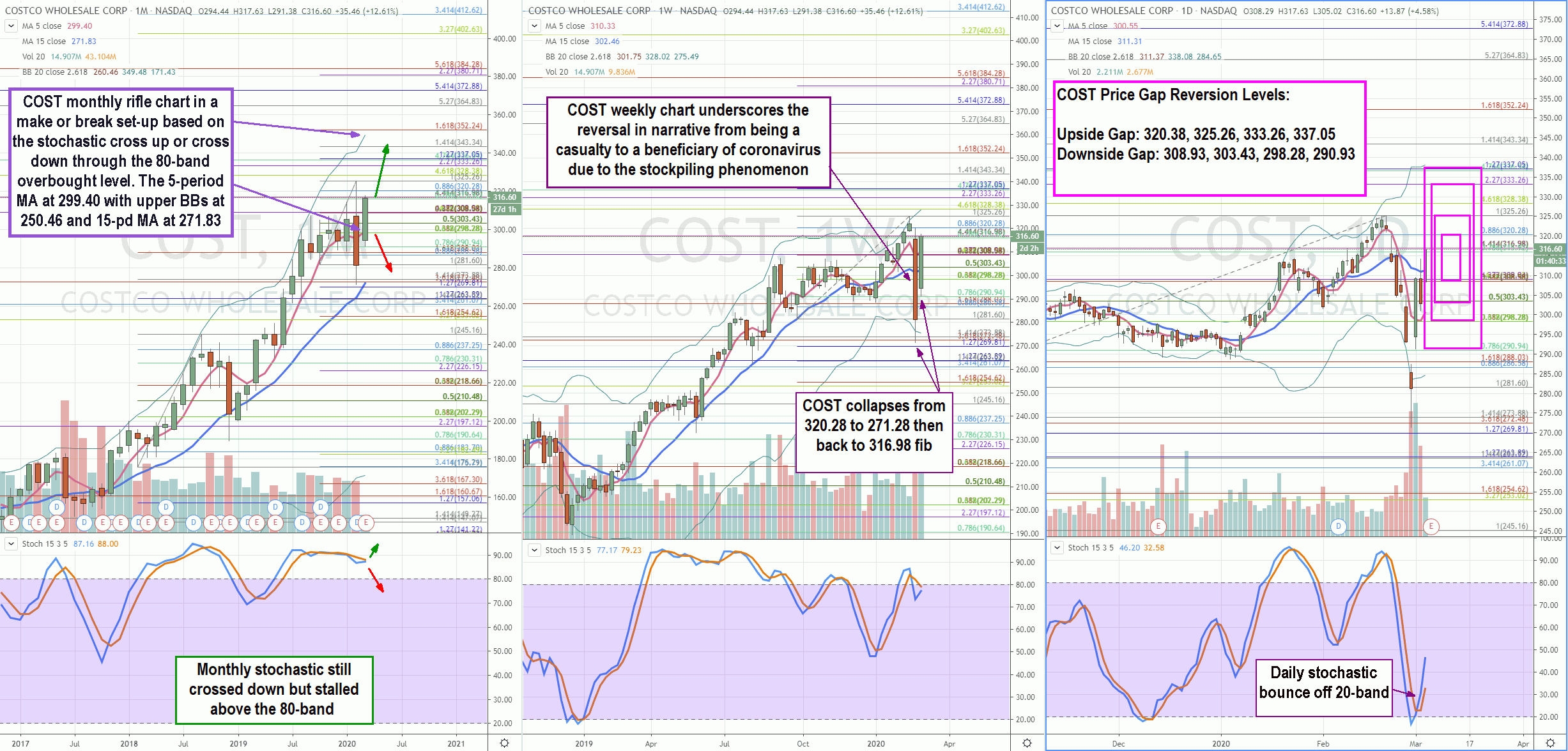Wholesale membership warehouse retailer
Costco Wholesale (NASDAQ: COST) has grown into the second-largest global retailer behind Walmart (NYSE: WMT) with 114 million square feet of warehouse footage serving 99.99 million membership cardholders as of the end of Q1 Fiscal 2020. Costco saw momentum in home furnishing, domestics, tired and pharmacy along with online grocery delivery. They initiated same-day prescription and alcohol delivery in 12 states. In the last earnings call, there was uncertainty with the China tariffs as well as the $7.5 billion in U.S. imports from the E.U. subject to a 20-percent tariff potentially going to 100-percent. Since then, the China Phase One deal was finalized, and the 100-percent tariffs were nixed. This should be a boon for the upcoming Q2 Fiscal 2020 earnings. However, shares took a steep collapse in correlation with the
S&P 500 (NYSEARCA: SPY) on Feb. 20, 2020 on coronavirus epidemic, triggering fears of global economic turmoil rocking the SPY in its fastest correction in history dropping (-12 percent) in six-trading days.
Upside of Coronavirus
While the coronavirus outbreak have caused many companies to cut their forward guidance due to supply chain disruptions and demand shock, the rush to stock up on consumer staples supplies emptying store shelves may actually be a boon to Costco. The stockpiling phenomenon could result in an upside surprise assuming there were no supply chain disruptions. Investors will want to know if warehouses in international hotspots for coronavirus infections will face guidance cuts. Costco has 26 warehouses in Japan, 16 in South Korea, 13 in Taiwan and one in China. The pace of the rebound in COST shares underscores a sharp change in sentiment stemming from the stockpiling narrative making it a beneficiary stock from coronavirus.
Earnings Catalyst
COST reports Q2 Fiscal 2020 earnings post-market on Thursday, March 5, 2020, followed by the 5:00 pm EST conference call. Consensus analyst estimates are for 2.06-EPS profit on revenues of $38.22 billion. Like most other retailers, investors are bracing for forward guidance cuts, but the stockpiling phenomenon may improve the narrative highlighting COST as one of the few beneficiaries of the epidemic. Investors will also want to know if COST still plans to move forward with “around 20” net new units in Fiscal 2020 as previously forecast. Visibility on the coronavirus epidemic’s impact on forward forecasts is at the top of the wish list.
Rifle Chart Technical Analysis Trajectories: Longer-Term
We use the rifle charts on wider time frames to lay out the playing field suitable for swing traders and investors. The monthly rifle chart is in a make or breaks formation after the brief rug pull from 325.28 highs to the 272.48 Fibonacci (fib) level overshoots and snap back to the 316.98 fib in nine-trading days. The rapid drop and bounce stalls out the weekly rifle charts into a make or break just like the monthly chart. This also forms the same make or break set-up on the daily charts as BBs are in expansion mode.

Sympathy Stocks:
COST has positive sympathy with the mega-retailers including Walmart (NYSE: WMT), Target (NYSE: TGT) and Big Lots (NYSE: BIG). The stockpiling narrative is actively spreading through these sympathy stocks are TGT recently received an upgrade March 4, 2020, under the same theme.
Trading Game Plan for Earnings Gap:
This information is accommodative to intraday and short-term traders looking to play the earnings gap. With a post-market earnings release on Thursday, March 5, 2020, immediately followed by the conference call at 8:30 am EST. Only the nimblest traders should even consider hitting the immediate reaction on the post-market release. If COST gaps down over 10-percent on the initial reaction, a reversion bounce could set-up heading into the 5:00 pm EST conference call. COST recovered most of the losses from the coronavirus shakeout heading into the earnings release with strong momentum.
Nimble pre-market traders can scalp the price gap reversion levels, but most should wait for the morning session off the opening bell. Traders can expect scalps ranging from 0.50 to 2.50 in the first 20-minutes as ranges and spreads eventually get tighter. Reversion scalps off the key price inflections levels can be played for the second gap reaction then shift focus to the third reaction trend move.
The gap price reversion levels for the upside price gaps are: 320.38 fib/sticky 5s zone, 325.26 fib, 333.26 fib and 337.05 fib. Downside gap reversion price levels are: 308.94 overlapping fibs, 303.43fib, 298.28 overlapping fibs and 290.93 fib. Make sure you do your pre-market preparation and plan your scalps ahead of the opening bell.
Before you make your next trade, you'll want to hear this.
MarketBeat keeps track of Wall Street's top-rated and best performing research analysts and the stocks they recommend to their clients on a daily basis.
Our team has identified the five stocks that top analysts are quietly whispering to their clients to buy now before the broader market catches on... and none of the big name stocks were on the list.
They believe these five stocks are the five best companies for investors to buy now...
See The Five Stocks Here
Just getting into the stock market? These 10 simple stocks can help beginning investors build long-term wealth without knowing options, technicals, or other advanced strategies.
Get This Free Report
Like this article? Share it with a colleague.
Link copied to clipboard.